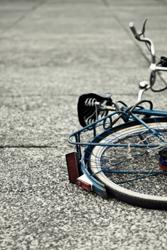- Free Consultation: (630) 527-4177 Tap Here to Call Us
Bicycle Accidents in Illinois: Who Has the Right-of-Way?
Bicycling is an increasingly popular mode of transportation in Illinois due to its environmental benefits and health advantages. However, with more cyclists sharing the road with motorists, the potential for conflicts and accidents arises. One common point of confusion and contention is the question of right-of-way: who must yield when a car and a bicycle intersect? Understanding the rules of the road in Illinois can help prevent accidents and ensure safety for both cyclists and motorists.
Illinois Bicycle Laws and Right-of-Way
In Illinois, under the Illinois Vehicle Code, bicycles are considered vehicles, and cyclists are granted the same rights and responsibilities as motorists. This means that the same traffic rules that apply to cars also apply to bicycles. However, there are specific scenarios where the question of who must yield between a car and a bicycle is critical.

Common Scenarios and Right-of-Way Rules
- Intersections with Traffic Signals:
- Signal Lights: At intersections controlled by traffic signals, cyclists and motorists must obey the traffic lights. A cyclist approaching a red light must stop and wait for the green light, just as a motorist would.
- Right Turns on Red: If a motorist or cyclist intends to turn right at a red light, they must come to a complete stop and yield to all oncoming traffic and pedestrians before proceeding.
- Stop Signs:
- Four-Way Stops: At four-way stops, the general rule is that the first vehicle to stop at the intersection has the right-of-way. If a car and a bicycle arrive at the same time, the vehicle to the right goes first. Cyclists and motorists must communicate and make eye contact to ensure the right-of-way is understood and followed.
- Two-Way Stops: When only one direction of traffic has stop signs, vehicles on the road without stop signs have the right-of-way. Cyclists must stop and yield to cross traffic before proceeding.
- Uncontrolled Intersections:
- At intersections without traffic signals or stop signs, the vehicle on the right has the right-of-way. Both cyclists and motorists should slow down and be prepared to yield if necessary.
- Bike Lanes and Passing:
- Bike Lanes: When a bicycle is in a designated bike lane, motorists must yield when merging into or crossing the bike lane. This is particularly important when making right turns.
- Overtaking Cyclists: Motorists overtaking a cyclist must do so at a safe distance, ideally changing lanes to pass if possible. Cyclists should stay to the right of the lane unless they are making a left turn or avoiding hazards.
- Pedestrian Crosswalks:
- Both cyclists and motorists must yield to pedestrians in crosswalks. Cyclists should dismount and walk their bikes across crosswalks if they are using pedestrian paths.
- Driveways and Parking Lots:
- Motorists exiting driveways, alleys, or parking lots must yield to cyclists on the sidewalk or roadway. Cyclists should be cautious and make themselves visible to drivers in these situations.
Safety Tips for Cyclists and Motorists
- For Cyclists:
- Be Visible: Wear bright clothing and use lights and reflectors, especially in low-light conditions.
- Signal Intentions: Use hand signals to indicate turns and stops.
- Stay Alert: Always be aware of your surroundings and watch for potential hazards.
- Follow Traffic Laws: Obey all traffic signals, signs, and lane markings.
- For Motorists:
- Watch for Cyclists: Always check for cyclists before making turns or changing lanes.
- Give Space: Maintain a safe distance when passing cyclists.
- Be Patient: Understand that cyclists have the right to use the road and be patient when sharing the road with them.
- Avoid Distractions: Stay focused on driving and avoid distractions that could lead to accidents.
Legal Implications of Failing to Yield
Failing to yield the right-of-way can result in serious accidents and legal consequences. In Illinois, both cyclists and motorists can be cited for traffic violations if they fail to adhere to right-of-way laws. In the event of an accident, the party who failed to yield may be found liable for damages, including medical expenses, property damage, and other costs associated with the collision.
Understanding and respecting right-of-way laws is essential for the safety of both cyclists and motorists on Illinois roads. By following traffic rules, staying alert, and practicing safe driving and riding habits, everyone can contribute to a safer and more harmonious road-sharing environment. If you or a loved one has been involved in a bicycle accident due to a failure to yield, consulting with an experienced personal injury attorney can help you navigate the legal process and seek the compensation you deserve. All in all, safety and mutual respect between motorists and cyclists are key to preventing accidents and ensuring that everyone can enjoy the benefits of cycling.
Contact the Illinois Car Accident Attorneys at John J. Malm & Associates
At our Naperville personal injury law firm, we are committed to supporting safe cycling and helping injured cyclists navigate their personal injury claim. If you or a loved one has been injured as a result of a bicycle accident or car accident, contact the Naperville car accident attorneys at John J. Malm & Associates to learn more about how you may be compensated for your injuries.















